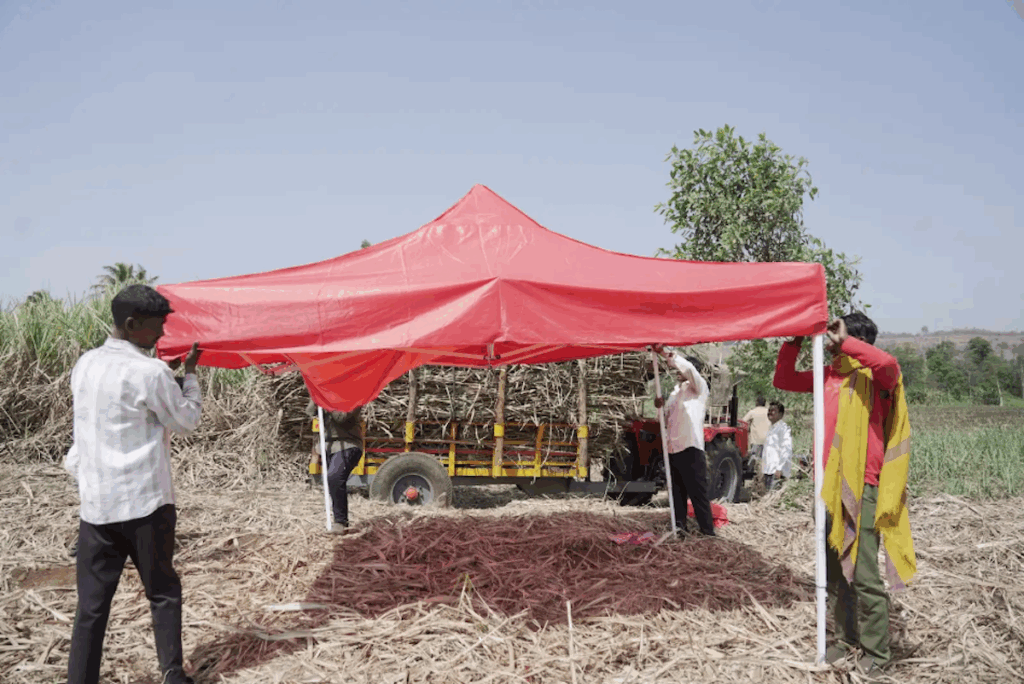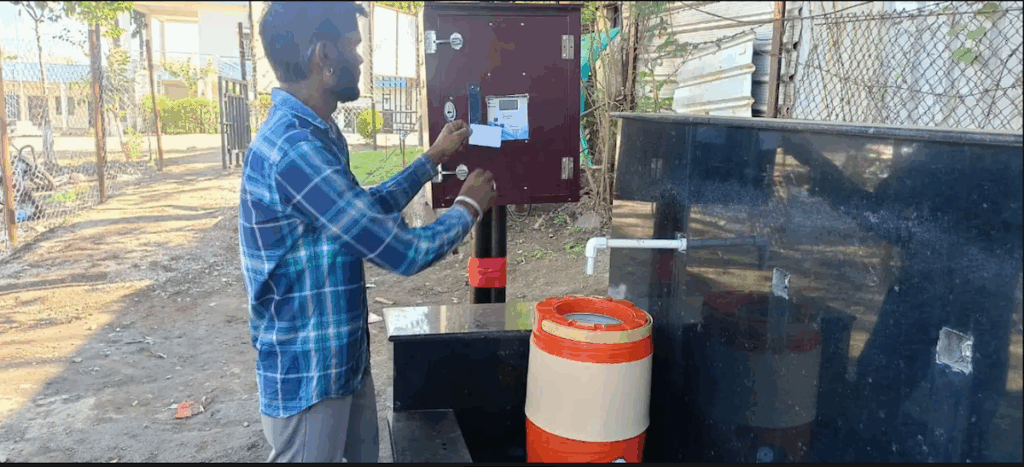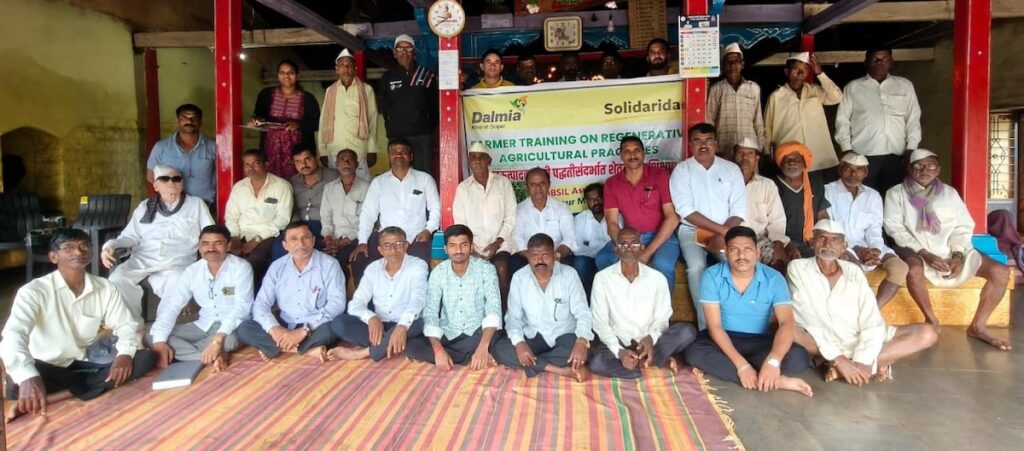Since its launch in September 2024, SEEDS– implemented in India by Solidaridad in partnership with The Coca-Cola Company– has focused on improving working conditions and expanding workers’ access to government welfare. The programme also supports farm sustainability across three sugarcane sourcing mills in Maharashtra, including one mill of Dalmia Bharat Sugar in Kolhapur and two of Baramati Agro Limited in Pune and Kannad.
KEY INTERVENTIONS AND THEIR IMPACTS
Designing Solutions with Workers
SEEDS uses participatory approaches, engaging workers through detailed interviews and discussions to ensure their voices shape programme interventions. During consultations with women workers, many reported that a lack of privacy when bathing and changing prevented them from maintaining proper hygiene, leading to increased cases of reproductive tract infections. In direct response, SEEDS will pilot a new intervention in the 2025–26 harvest season: private changing and bathing tents at worker camps. These facilities aim to give women privacy and dignity while reducing health risks linked to poor sanitation and unsafe bathing conditions.
Championing Decent Work
In its very first operational harvest season (December 2024–March 2025), SEEDS delivered measurable outcomes that have begun to improve conditions for sugarcane farmers. A total of 60 Decent Work Champions were trained across the three mills. Drawn from the mills’ cane staff, these Champions now serve as vital links between mill management and migrant harvest and transport workers.
Equipped with skills and knowledge on decent work principles, occupational health and safety, gender sensitivity, grievance redressal and workers’ rights, they are now playing a crucial role in raising awareness about workers’ challenges. Simultaneously, they are strengthening the business case for decent work, demonstrating how improved welfare leads directly to enhanced productivity, reduced absenteeism and better mill performance.
Ensuring Shade and Dignity for Worker
To address the challenging physical conditions faced by cane cutters, SEEDS supported the establishment of 400 portable shade tents distributed across work groups, also known as “gangs,” that collectively provide for more than 5,000 workers. Each gang of 10–14 workers now has access to a movable tent that can be shifted between worksites, ensuring workers a shaded place to rest during peak heat hours. This simple yet vital support has reduced the risks of heat stress, fatigue and related health concerns, while also improving workers’ overall wellbeing and productivity.

Access to Safe Drinking Water
Access to safe drinking water has been another cornerstone of SEEDS’ first harvest season. First, Solidaridad procured one reverse osmosis (RO) plant for each mill command area. Then, the mills constructed permanent structures to house the RO systems and water ATMs, and took responsibility for long-term operation and maintenance. Each unit produces up to 12,000 litres of safe water per day, guaranteeing that every worker can access a minimum of six litres daily.
Additionally, more than 700 gangs were equipped with durable 18-litre jars and an innovative water ATM card system. Each gang receives an ATM card that, when swiped, disburses exactly 18 litres of water into the jar. With sufficient jars allocated per gang, this system ensures that every worker has reliable daily access to between 3–6 litres of clean water, thereby significantly reducing risks of dehydration and waterborne illness.

Health and Wellbeing at the Core
In addition to the physical infrastructure, SEEDS has prioritized worker health through a series of medical camps organized in collaboration with local primary health care centres (PHCs). At these camps, workers received comprehensive check-ups including blood pressure monitoring, eye tests, chest X-rays and general health screenings. For those who consented, complete blood count tests were conducted, with results shared with both workers and PHCs to support follow-up care.
Importantly, special sessions for women workers focused on menstrual health and safe practices, and also provided access to appropriate materials. By combining immediate medical support with long-term awareness, these camps have laid the groundwork for lasting health improvements among migrant worker communities.

Education for Migrant Children
Recognizing that migration often disrupts children’s education, SEEDS has also initiated advocacy with government education officers, starting in Kolhapur. The goal is to ensure that the children of seasonal migrants can access local schools in mill command areas under the provisions of the Right to Education Act.
By addressing systemic barriers to school enrollment and building partnerships with government institutions, SEEDS is working to reduce the educational disadvantages faced by migrant children, ensuring they are not excluded from basic schooling opportunities.
Regenerating the Land
Environmental sustainability is a central pillar of SEEDS. Over 1,000 farmers across two mill command areas have been trained in regenerative agriculture practices such as ratoon management, intercropping, mulching, soil health testing and reducing chemical inputs. Demonstration plots will showcase the benefits of these techniques and encourage wider adoption, creating a pathway for long-term improvements in soil fertility, water efficiency and farm resilience.
In the coming months, SEEDS will also roll out digital advisory services and weather monitoring stations in each mill area. Through SMS, WhatsApp and app-based platforms, farmers will receive localized weather forecasts, irrigation scheduling, pest and disease alerts and fertilizer recommendations.

Towards Measurable Sustainability
Looking ahead, farmer groups in the Kolhapur mill command area that have already been audited against the Regenagri standard are now being supported for continuous improvement. These groups will serve as the foundation for piloting carbon insetting initiatives, linking agricultural improvements with measurable sustainability outcomes. While the detailed methodology is still being finalized, this work signals SEEDS’ commitment to aligning farm-level practices with global climate objectives and responsible sourcing standards.
Partnering for Lasting Change
“Coca-Cola is committed to building supply chains that respect people and the planet. Through our partnership with Solidaridad under SEEDS, we are supporting meaningful improvements in working conditions for thousands of migrant sugarcane workers while also empowering farmers to adopt regenerative agriculture. This programme demonstrates that sustainability and social responsibility go hand in hand, and we look forward to continuing to support initiatives that aim to build long-term resilience and prosperity in Maharashtra’s sugarcane sector”
Rajesh Ayapilla, Director, CSR and Sustainability for India and South West Asia
By combining direct worker welfare interventions with farmer capacity building and community advocacy, SEEDS is laying the groundwork for a more inclusive, sustainable sugarcane sector in Maharashtra.
You can read the partnership launch story here

